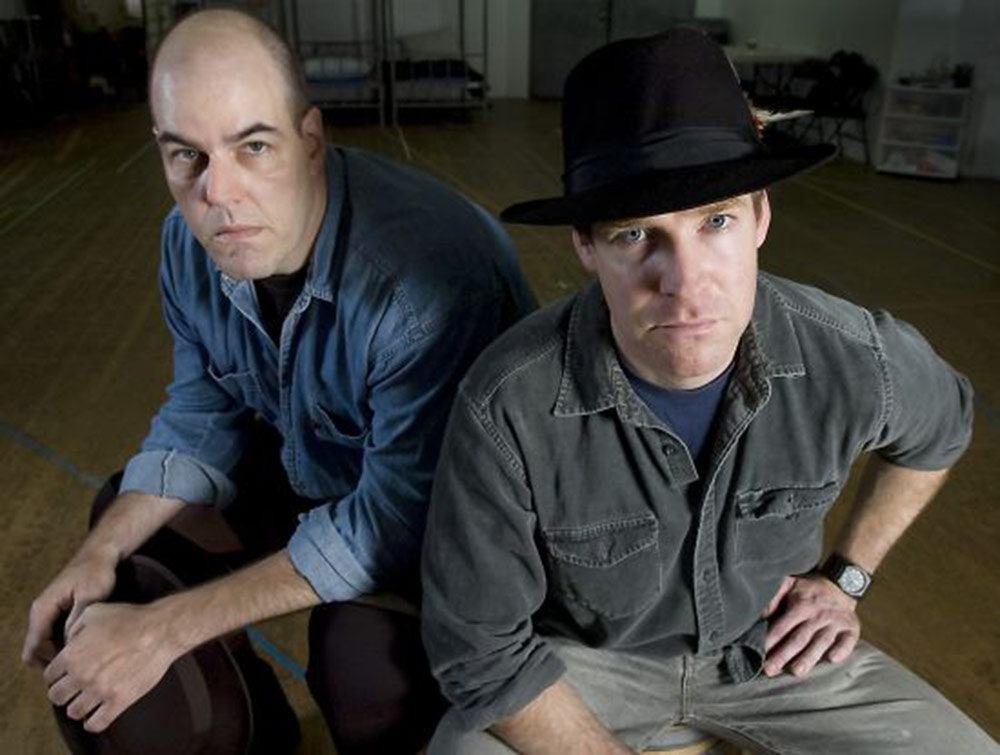OF MICE AND MEN
WESTPORT COUNTRY PLAYHOUSE
The Connecticut Post
It would seem George Milton and Lennie Small, the itinerant farm workers at the center of John Steinbeck's Of Mice and Men, would each be better off without the other.
Lennie, a strong but simple-minded man, would be spared George's constant derision, while George, a streetwise and cynical companion, could live without the burden of watching out for Lennie.
But the men are connected through friendship and loyalty that shields them from the loneliness that marks their nomadic existence.
Binding them, like brothers, is a shared yet seemingly hopeless dream of escaping the backbreaking work and one day owning a farm. It helps them escape the daily brutality of their tragic condition while giving George the excuse to stick by Lennie, no matter what trouble comes his way.
"I find the relationship between George and Lennie so moving,'' says Mark Mineart, who will play Lennie in the Depression-era drama opening Tuesday at the Westport Country Playhouse. The production, to be directed by Mark Lamos, former artistic director of Hartford Stage, is dedicated to the memory of the late Paul Newman, who had originally been scheduled to direct the play.
"The last time I read the play, I was moved by the dreams every character has but cannot achieve,'' says Mineart, who likens Lennie to a gentle giant, an innocent. "These are people who say out loud what they want, but we see they cannot achieve simple things.''
Part of what also makes the play moving for Brian Hutchison, who plays George, is the lyric humanity injected into how George cares for Lennie.
His point is seen later, during a run-through with Mineart and the rest of the cast, when he delivers a line early in the play: "Guys like us that work on ranches is the loneliest guys in the world. They ain't got no family. They don't belong no place. They come to a ranch and work up a stake and then they go into town and blow their stake. And then the first thing you know they're poundin' their tail on some other ranch. They ain't got nothin' to look ahead to.''
It highlights their friendship and draws sympathy to a situation in a way that belies the specificity of the period in which the action takes place.
"This many years later, the language is simple and graceful,'' he says.
"When you hear the whole thing, it's so poetic and gorgeous,'' adds Mineart.
Of Mice and Men, written by Steinbeck as a novella in 1937 and adapted for the theater in November of the same year, tells the story of the two ranch hands who drift from one menial job to another, never staying long because of trouble that finds Lennie.
In the play's opening, George and Lennie are running from a mob after Lennie was falsely accused of rape. The two end up at another ranch, where they meet other similarly desolate drifters. As hard as George and Lennie try to avoid it, trouble soon follows. It is a story many know, the resulting conclusion well known.
Lamos says knowing the outcome gives the production a different kind of dramatic impact. Compare the tragedy to the story of the Titanic. We know the ship will sink. What happens in the meantime lends drama to the story of those on board.
"It's exciting when the audience knows the piece,'' he says. "They invest in it in a different way. It's like listening to Beethoven's Ninth [Symphony] or seeing a Chekhov play. You still get something new out of it.''
The impact is stressed by the foreshadowing written into the script and elaborated on stage.
"It bears close ties to tragic theater and its cathartic qualities,'' he continues. "In Greek dramas, you know what is coming but you are also invited to work out certain feelings.''
Comparisons between actors' and directors' interpretations are inevitable when staging a classic play, says Lamos, but when actors deliver the underlying truths woven into the script, the humanity stands out. It is up to the audiences to determine what that truth means to them at that point.
"I once heard and have found it to be true,'' says Mineart. "that every great play is about creating family.''
